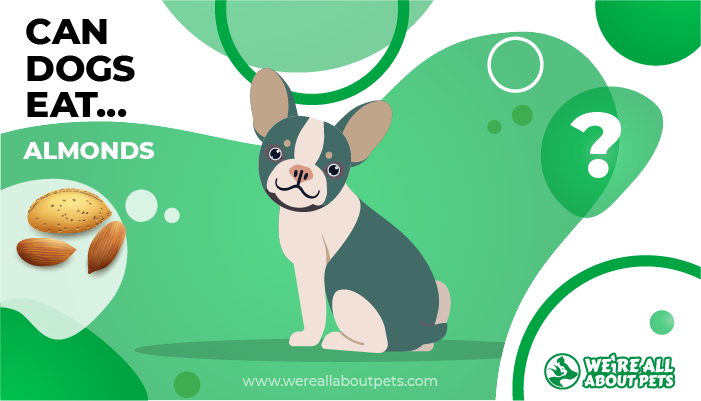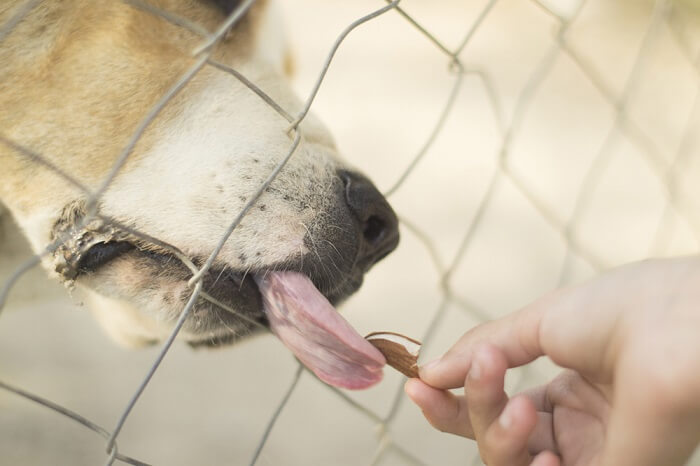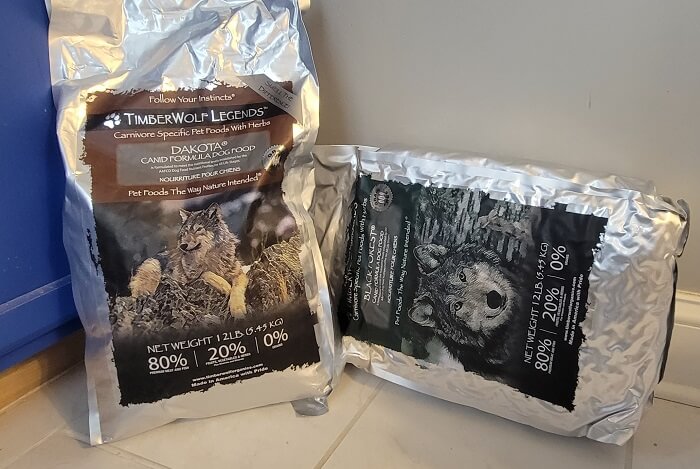Can Dogs Eat Almonds?
This page contains affiliate links. We may earn money or products from the companies mentioned in this post through our independently chosen links, which earn us a commission. Learn More

Nuts are often a confusing food for dog lovers. It’s true that some nuts, such as macadamia nuts, are toxic to dogs. However, not all nuts are harmful to dogs.
That doesn’t mean that dogs can easily digest nuts in general. If you’re wondering, “Can dogs eat almonds?,” the answer is complicated.
Find out more about almonds and your dog by reading our short guide.
Almonds Nutrition Stats
These figures are based on one cup of sliced almonds which contains 92 grams.
- Calories: 529 (26% daily value)
- Protein: 19.5 g (39% daily value)
- Carbohydrates: 19.9 g (7% daily value)
- Fat: 45.5 g (70% daily value)
- Fiber: 11.2 g (45% daily value)
- Vitamin E (Alpha Tocopherol): 24.1 mg (121% daily value)
- Manganese: 2.1 mg (105% daily value)
- Vitamin B6: 0.1 mg (7% daily value)
- Phosphorus: 445 mg (45% daily value)
- Copper: 0.9 mg (46% daily value)
- Zinc: 2.8 mg (19% daily value)
- Selenium: 2.3 mcg (3% daily value)
- Thiamin: 0.2% mg (13% daily value)
- Folate: 46 mcg (11% daily value)
- Potassium: 649 mg (19% daily value)
- Calcium: 243 mg (24% daily value)
- Magnesium: 247 mg (62% daily value)
- Niacin: 3.1 mg (16% daily value)
- Pantothenic acid: 0.4 mg (4% daily value)
- Riboflavin: 0.9 mg (55% daily value)
- Iron: 3.4 mg (19% daily value)
One ounce of almonds is 28 grams and contains 164 calories.
Almonds Nutritional Facts At A Glance

Almonds are very high in protein, fat, and fiber, as well as several vitamins and minerals such as vitamin E (alpha tocopherol), riboflavin (and other B vitamins), magnesium, and manganese. They are also high in phosphorus, copper, and calcium.
Overall, almonds are made up of 15 percent carbohydrates, 72 percent fats, and 13 percent protein.
Studies suggest that almonds have health benefits for heart health, diabetes, and for weight management since some of the fat in almonds are monosaturated fats. This means that they can be a heart-healthy snack. Eating almonds in place of snacks with saturated fats may help lower LDL (bad) cholesterol levels.
The potassium in almonds is also good for heart health and can lower blood pressure. It’s even been suggested that eating almonds is good for people suffering from hyperlipidemia (excess lipids or lipid proteins in the blood).
There is also some evidence that eating almonds may help regulate blood sugar levels for diabetic patients. Another study suggested that eating almonds might reduce the risk of some forms of cancer. More studies are needed.
Almonds are a favorite snack for people who are dieting became they can be a healthy way to satisfy cravings between meals. They are a healthier treat than foods with refined sugar or that are high in complex carbohydrates.
Almonds are not considered to be true nuts. Instead, they are seeds or “drupes.” Drupes have a tough rind that surrounds a shell which contains a seed inside. The almond that people enjoy is the seed. Pistachios are a similar drupe. Peaches and apricots, which are stone fruits, are closely related to the almond. They are also technically drupes.
A one-ounce serving of almonds (about 23 almonds) contains 6 grams of protein and 4 grams of fiber, along with a plethora of vitamins and minerals. Almonds are a low-glycemic index food. That one-ounce serving also contains about 14 grams of fat, though nearly two-thirds of those grams are monosaturated and heart-healthy.
Almonds are most healthy when they are eaten whole, with their brown skins intact. These are unblanched almonds. Blanched almonds have their skins steamed off. The almond skin contains about 20 powerful antioxidant flavonoids which may help cholesterol levels, inflammation, and other health problems.
On the down side, some people are allergic to almonds. This is similar to other tree nut allergies. When it occurs it is usually severe. These are the allergies that are most likely to result in anaphylaxsis.
Symptoms may include: abdominal pain, diarrhea, difficulty swallowing, nasal congestion or a runny nose, nausea, shortness of breath, and itching. Nuts and products made from nuts, such as butter and oils, can both produce an almond allergy attack.
Almonds can be subject to aflatoxins, chemicals that are produced by a mold. You should not eat any almonds that appear moldy. This mold can have a gray or black appearance.
It’s also possible for almonds to be affected by Salmonella. There have been recalls of almonds for this reason in the past. The USDA now requires growers in California to pasteurize almonds with steam before selling though organic almond growers have resisted and taken the USDA to court.
A 2017 study found that regularly drinking almond milk (and other alternative milks) instead of cow’s milk could lead to iodine deficiency. These milks are not supplemented with iodine. Iodine is essential for fetal development and for the human body to make thyroid hormones. Remember that not all health benefits for humans transfer to dogs.
Can Dogs Eat Almonds?

Various web sites online will tell you yes – or no – about dogs eating almonds. The truth is that dogs can eat almonds without deadly consequences. Almonds are not toxic to dogs and they can eat them safely.
However, almonds contain lots of fiber and lots of fat. Dogs that eat more than a couple of almonds may have difficulty digesting them and end up with an upset stomach. Foods with high fat content, such as nuts, can also produce pancreatitis in pets.
Many nuts, such as almonds, are sold already salted so your dog could possibly develop something called sodium ion toxicosis (salt poisoning). This salt toxicity develops when the salt from the salted nuts leads to too much water retention. He would have to eat a lot of salted nuts, it’s true, but it is possible.
Because of their size and shape, almonds can be a choking hazard for some dogs, especially if you have a dog that likes to steal or inhale food or a smaller dog. An almond can easily go down the windpipe if your dog eats it too quickly.
Some dogs can also develop allergies to almonds which can be severe.
Are Almonds Good for Dogs?
Theoretically, yes, almonds could be good for dogs because of their vitamins and minerals. You may find them appearing as an ingredient in a dog cookie recipe or even in a dog food. (I think I’ve seen dog cookie recipes that use almond flour.) Used in these forms, almonds could be good for your dog.
Otherwise, it’s probably best if you don’t plan on giving your dog almonds or other nuts because of some of the risks involved.
Many dogs love the taste of almonds so you should be careful if you have almonds in your home.
How Many Almonds Can Dogs Eat?
If your dog eats one or two almonds, it’s probably not anything to worry about. Especially if there is no sign of choking or digestive tract problems such as diarrhea. If your dog experiences any distress, call your veterinarian or poison control immediately.
If you discover that your dog has eaten large quantities salted almonds, take him to the vet right away. Gastrointestinal upset and inflammation of the pancreas are both serious problems that can result from eating large amounts of nuts.
How Often Can Dogs Eat Almonds?
It’s best to avoid giving your dog almonds. If he accidentally eats some you should monitor him for any ill effects.
Dogs can eat almond butter but you should watch the calories. One tablespoon of almond butter contains 98 calories so you can see that the calories would add up quickly.
The Correct Diet Is Important
Dogs need to eat the correct diet for good health. All dogs need good quality protein and fat appropriate for their age, lifestyle, and health condition in order to thrive. Most healthy dogs need the following things in their diet:
- Good Sources of Protein- Meat, fish, poultry, and eggs are all good sources of animal protein. Animal protein is generally easier for dogs to digest. The more accurately the protein is identified on the label, the better.
- Good Sources of Fat- Fat provides essential fatty acids (EFA) and helps distribute the fat soluble vitamins A, D, E, and K so your dog can absorb them easily.
- Named Ingredients- Named ingredients are usually better than generic ingredients. The more specific, the better, so you know precisely what your dog is eating.
- Low to Moderate Carbohydrates- Most experts recommend diets that contain low to moderate amounts of carbohydrates. Carbohydrates are not “bad” for dogs but they should not be used as a substitute for protein. Many carbs do double duty as dietary fiber and probiotics.
- Avoid Artificial Preservatives, Colors, and Sweeteners- Artificial preservatives and colors/dyes have been linked to some health problems in humans and animals. You should try to avoid these ingredients in dog foods.
- AAFCO- AAFCO is the Association of American Feed Control Officials. AAFCO sets voluntary standards for pet food labeling. Look for foods that have these minimum standards.
- Fresh Water- All dogs need access to fresh water unless they are ill or have some other reason to be temporarily kept away from water. For example, if you are house training your puppy, you can safely put away water overnight.
If your dog has health problems of any kind, please see a veterinarian for dietary advice. Regular diets may need to be adjusted. Your dog may not be able to eat some fruits and vegetables so ask your vet.
What Are Other Healthy Alternatives to Almonds In A Dog’s Diet?

Almonds may not be a safe snack for your dog but there are many other healthy foods you can give your dog in small amounts.
You should consider these human foods as healthy snacks. Check with your veterinarian if your dog has any health issues and you are concerned about giving any of these foods.
Remember that not all parts of a fruit or vegetable are safe for dogs in some cases.
- Apples
- Asparagus
- Avocados
- Bananas
- Bell pepper
- Broccoli
- Brussels sprouts
- Carrots
- Cauliflower
- Cucumbers
- Green beans
- Mangos
- Oranges
- Parsnip
- Pears
- Pineapple
- Pumpkin
- Strawberries
- Summer squash
- Sweet potato
- Tomatoes
- Watermelon
- Zucchini
How Do You Give Your Dog Almonds?
If you want your dog to have some of the nutritional benefits of almonds, you can give him some almond butter. Almond butter is the smooth, crushed version of almonds that’s made into a butter, similar to peanut butter. Look for the unsalted version.
Conclusion
There is nothing toxic about almonds. However, most veterinarians recommend that you do not give them to your dog for safety reasons. They are not easy for the dog’s digestive system because of their high fat and fiber content.
They can be choking hazards. If they are salted they can be harmful to your dog. And, some dogs can be allergic to them. If your dog eats a couple of almonds they probably won’t harm him but if he eats a bag of almonds you should monitor him to make sure he doesn’t become ill.








